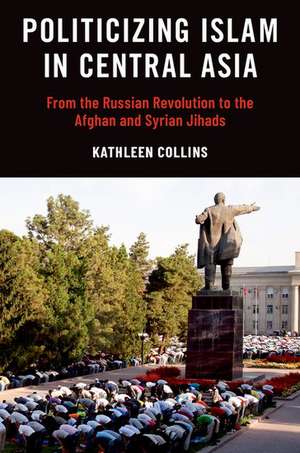Politicizing Islam in Central Asia: From the Russian Revolution to the Afghan and Syrian Jihads
Autor Kathleen Collinsen Limba Engleză Paperback – 14 dec 2023
Preț: 163.13 lei
Preț vechi: 182.23 lei
-10% Nou
Puncte Express: 245
Preț estimativ în valută:
31.22€ • 32.25$ • 25.97£
31.22€ • 32.25$ • 25.97£
Carte disponibilă
Livrare economică 15-21 februarie
Livrare express 12-18 februarie pentru 61.67 lei
Preluare comenzi: 021 569.72.76
Specificații
ISBN-13: 9780197685075
ISBN-10: 0197685072
Pagini: 584
Ilustrații: 36 b/w halftones; 1 b/w line drawing; 6 tables; 7 maps
Dimensiuni: 235 x 157 x 34 mm
Greutate: 0.85 kg
Editura: Oxford University Press
Colecția OUP USA
Locul publicării:New York, United States
ISBN-10: 0197685072
Pagini: 584
Ilustrații: 36 b/w halftones; 1 b/w line drawing; 6 tables; 7 maps
Dimensiuni: 235 x 157 x 34 mm
Greutate: 0.85 kg
Editura: Oxford University Press
Colecția OUP USA
Locul publicării:New York, United States
Recenzii
Remarkable in scope and depth, drawing on everything from interviews in the Ferghana Valley to jihadi propaganda in multiple languages, Collins' book is a contender for the definitive work on the rise of militant Islamism in Central Asia.
A groundbreaking study of Islamism's evolution in Central Asia, Kathleen Collins' remarkable feat of scholarship should be required reading for all serious analysts and observers of this important region. Collins' book offers irrefutable evidence that religious freedom is the best counterterrorism policy.
Politicizing Islam covers a lot of ground and is based on a massive amount of sustained original research. Collins traces three waves of Islamist mobilization, each one a response to state repression. Her use of interviews and focus groups allows her to bring society back in into the analysis. She makes a clearly thought-out argument on the basis of impressive research.
Collins achieves something extraordinary in this masterful and careful analysis of Islamism in Central Asia. Based on years of in-depth interviews, archival materials, and other sources, Collins traces the emergence of Islamist movements, from the moderate and democratic to the radical and militant in Kyrgyzstan, Tajikistan, and Uzbekistan. Along the way, she reveals the lived experiences of many Kyrgyz, Tajik, and Uzbek religious believers. Without demonizing Islam or sensationalizing Islamism, Collins enriches our understanding of both Soviet and post-Soviet religious repression and its unintended consequences: making Islam more resilient and fostering a religious basis for political opposition. Anyone endeavoring to understand the fabric of modern-day Central Asia should closely read Collins' scholarship.
Highly recommended. Advanced undergraduates through faculty; professionals.
A groundbreaking study of Islamism's evolution in Central Asia, Kathleen Collins' remarkable feat of scholarship should be required reading for all serious analysts and observers of this important region. Collins' book offers irrefutable evidence that religious freedom is the best counterterrorism policy.
Politicizing Islam covers a lot of ground and is based on a massive amount of sustained original research. Collins traces three waves of Islamist mobilization, each one a response to state repression. Her use of interviews and focus groups allows her to bring society back in into the analysis. She makes a clearly thought-out argument on the basis of impressive research.
Collins achieves something extraordinary in this masterful and careful analysis of Islamism in Central Asia. Based on years of in-depth interviews, archival materials, and other sources, Collins traces the emergence of Islamist movements, from the moderate and democratic to the radical and militant in Kyrgyzstan, Tajikistan, and Uzbekistan. Along the way, she reveals the lived experiences of many Kyrgyz, Tajik, and Uzbek religious believers. Without demonizing Islam or sensationalizing Islamism, Collins enriches our understanding of both Soviet and post-Soviet religious repression and its unintended consequences: making Islam more resilient and fostering a religious basis for political opposition. Anyone endeavoring to understand the fabric of modern-day Central Asia should closely read Collins' scholarship.
Highly recommended. Advanced undergraduates through faculty; professionals.
Notă biografică
Kathleen Collins is Associate Professor of Political Science and an Affiliate Faculty of Islamic Studies at the University of Minnesota, Twin Cities. Collins is recipient of the national Carnegie Scholar Award and the McKnight Land-Grant Professorship Award. Collins is also author of Clan Politics and Regime Transition in Central Asia (2006), which won the award for the best book in the social science fields from the international Central Eurasian Studies Society. She won the S. M. Lipset Award in a national competition for the best dissertation in Comparative Politics or Sociology. She has published two dozen academic articles in edited books and journals. Collins teaches doctoral and undergraduate courses on Central Asian politics, Russian/Soviet history and politics, Afghanistan's wars, political Islam, Islam and democracy, and religion and politics. Additionally, she has worked on projects with or consulted for the United States Agency for International Development, the United NationsDevelopment Program, the International Crisis Group, the National Bureau of Asian Research, and Freedom House. She has presented her work to multiple US government agencies, including the Helsinki Commission, the Department of State, and the Department of Defense.
